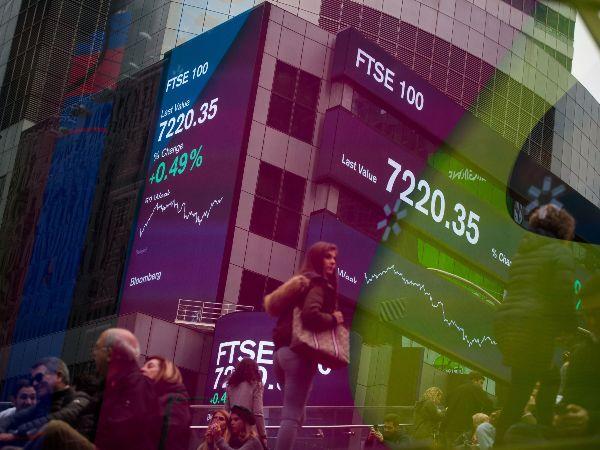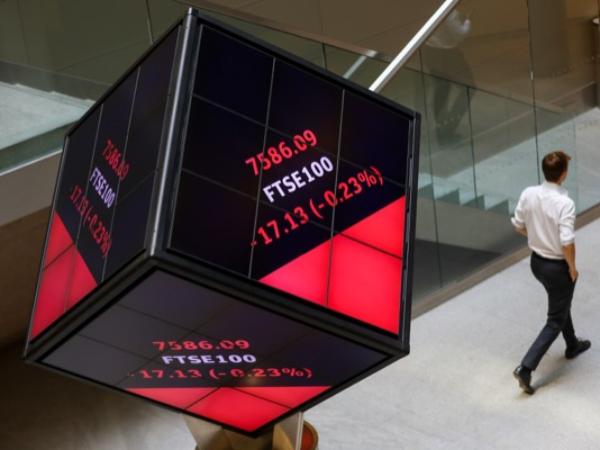Russia-Ukraine crisis could be the catalyst for a FTSE 100 crash
The FTSE 100 index’s prospects for 2022 are faltering as Russia’s war with Ukraine looks set to become a protracted economic disaster.
 Source: Bloomberg
Source: Bloomberg
The FTSE 100 index saw £133 billion wiped off its value last week, as Russia’s inept invasion of Ukraine continues to escalate.
With interest rates set to rise to combat spiralling inflation, oil prices at multi-year highs, and international travel restrictions lifting as the impact of Omicron faded, the FTSE 100’s oil, bank and travel stocks seemed set to soar just a week ago.
The index was worth 7,674 points on 17 January 2020, before the covid-19 pandemic crash saw it sink to 5,191 points by 20 March 2020. By 10 February 2022, it had recovered to 7,672 points, just two points shy of its pre-pandemic price. Long-term index investors might have already bought their champagne.
But its since fallen 8.9% to 6,987 points, nearing correction territory. A FTSE 100 crash could be next.
FTSE 100: lengthy European war?
Vladimir Putin’s invasion plan was for a rapid conquest of Ukraine. But in the 11 days since Russia invaded its neighbour, it has captured only one major city, Kherson.
Britain believes Russia is now resorting to targeting civilians as it has ‘previously used similar tactics in Chechnya in 1999 and Syria in 2016.’ Ukrainian Deputy PM Olha Stefanishyna has accused Russia of carrying out a ‘terroristic plan…shelled hospitals, the shelled houses for kindergartens and schools, and the ordinary households.’
And Russian shelling last week set alight Europe’s largest nuclear power plant, Zaporizhzhia. US ambassador Linda Thomas-Greenfield believes Europe ‘narrowly avoided nuclear catastrophe.’ The UN estimates over 1.5 million people have fled Ukraine, despite the violation of humanitarian corridors and ceasefires. Meanwhile, Putin has warned ‘the current leadership needs to understand that if they continue doing what they are doing, they risk the future of Ukrainian statehood.’
He has also cautioned ‘anyone who would consider interfering from the outside - if you do, you will face consequences greater than any you have faced in history.’ And he’s put Russia’s nuclear forces on elevated alert, warning that western economic sanctions are ‘akin to an act of war.’
Meanwhile, US Secretary of State Antony Blinken has given NATO members the ‘green light’ to send fighter planes to Ukraine, despite ruling out a no-fly zone. And he’s advocating that the country ‘can absolutely win against Russia,’ adding ‘the war has already not gone as Russian president Vladimir Putin might have planned.’
US President Joe Biden believes Putin has ‘badly miscalculated.’ As the Rouble collapses, he’s warned that the US and its allies would defend ‘every inch of territory of NATO countries.’
 Source: Bloomberg
Source: Bloomberg
FTSE 100 Crash?
Russia and Ukraine are key exporters of multiple key resources. And according to the S&P GSCI Index, the war has already caused the biggest weekly surge of commodities prices since the 1974 oil crisis.
Chicago Wheat has soared 50% in two weeks to a 14-year high. High bread prices have previously caused revolutions in Russia; during the 1650 Novgorod uprising and the 1918 murder of Czar Nicholas II. According to the UN, global food prices had already jumped 24% year-over-year to a record high in February. And this was before the invasion began.
Meanwhile, the Dutch Title Transfer Facility for gas is at €200 per megawatt-hour, its highest ever price point. Brent Crude is trading at $115 a barrel; JP Morgan analysts predict it could go as high as $185 by the end of the year. And US Secretary of State Anthony Blinken is engaging in ‘very active discussion’ with allies to ban Russian oil and gas exports. This would send UK energy bills over £3,000 a year.
In addition, Palladium, Aluminium, Spot Gold and Nickel are all at multi-year highs, approaching record prices. World Bank President David Malpass believes the war is a ‘catastrophe’ that will cut global economic growth, which ‘comes at a bad time for the world because inflation was already rising.’
Oil giants BP and Shell are selling their Russian investments, weakening their shares prices despite rising oil prices. HSBC and Barclays, previously slated to spike on rising interest rates, also fell last week on weak economic growth prospects. IAG and Rolls-Royce are also sinking as fears of a wider European war dampen the nascent travel recovery.
Meanwhile, miners Evraz and Polymetal International, which operate mostly out of Russia, have fallen out of the index as their valuations collapsed. London has now suspended 36 Russian stocks, with none now trading in the city.
Russia’s Foreign Ministry’s Maria Zakharova has warned that ‘Russia will not forget Britain’s desire to co-operate with ultra-nationalist forces in Ukraine…sanctions hysteria…leaves us no choice but to take proportionately tough retaliatory measures.’ Tellingly, British 10-year government bonds recorded their biggest weekly rise in over a decade.
With western companies abandoning Russia, the next FTSE 100 crash could be hastened as Putin’s invasion metamorphizes into protracted military and economic warfare.
Trade what you want, when you want with the UK’s No.1 trading provider.* We have over 80 top global indices with more trading hours than anyone else. Find out more about indices trading or open an account to trade now.
*Based on revenue excluding FX (published financial statements, June 2020).





.jpg.27c55ea07d5a17683fbdbda06b8fcace.jpg)
0 Comments
Recommended Comments
There are no comments to display.
Create an account or sign in to comment
You need to be a member in order to leave a comment
Create an account
Sign up for a new account in our community. It's easy!
Register a new accountSign in
Already have an account? Sign in here.
Sign In Now